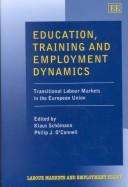| Listing 1 - 4 of 4 |
Sort by
|

ISBN: 1840642785 9781840642780 Year: 2002 Publisher: Cheltenham: Elgar,
Abstract | Keywords | Export | Availability | Bookmark
 Loading...
Loading...Choose an application
- Reference Manager
- EndNote
- RefWorks (Direct export to RefWorks)
Labour market --- Personnel management --- European Union --- Occupational training --- Manpower policy --- 331.5 --- 331.56 --- -Occupational training --- -#SBIB:316.334.1O350 --- #SBIB:316.334.1O210 --- #SBIB:316.334.2A86 --- #SBIB:35H435 --- Job training --- Manpower development and training --- Manpower training programs --- Vocational training --- Education --- Training --- Education and training services industry --- Practice firms --- Employment policy --- Human resource development --- Labor market --- Labor market policy --- Manpower utilization --- Labor policy --- Labor supply --- Trade adjustment assistance --- Arbeidsmarkt. Werkgelegenheid --(algemeen) --- Werkloosheid. Arbeidsreserve --- Onderwijs en economie --- Onderwijsbeleid: algemeen --- Bijzondere arbeidsproblemen: arbeidsvorming, kredieturen, beroepsopleiding --- Beleidssectoren: economisch en werkgelegenheidsbeleid --- Government policy --- 331.56 Werkloosheid. Arbeidsreserve --- 331.5 Arbeidsmarkt. Werkgelegenheid --(algemeen) --- #SBIB:316.334.1O350 --- Occupational training - European Union countries --- Manpower policy - European Union countries
Book
ISBN: 1859726240 Year: 1997 Publisher: Aldershot, Hants, England ; Brookfield, Vt. : Ashgate,
Abstract | Keywords | Export | Availability | Bookmark
 Loading...
Loading...Choose an application
- Reference Manager
- EndNote
- RefWorks (Direct export to RefWorks)
Manpower policy --- Unemployment --- Labor market --- Emploi --- Chômage --- Marché du travail --- Politique gouvernementale --- #SBIB:316.334.2A471 --- #SBIB:328H2153 --- Arbeidssociologie: de overheid en het tewerkstellingsbeleid --- Instellingen en beleid: Ierland --- Chômage --- Marché du travail --- Employment policy --- Human resource development --- Labor market policy --- Manpower utilization --- Government policy --- Labor policy --- Labor supply --- Trade adjustment assistance
Book
ISBN: 0192510789 0191834386 0192510797 Year: 2017 Publisher: Oxford : Oxford University Press,
Abstract | Keywords | Export | Availability | Bookmark
 Loading...
Loading...Choose an application
- Reference Manager
- EndNote
- RefWorks (Direct export to RefWorks)
This work presents a systematic analysis of the Great Recession, austerity, and subsequent recovery in Ireland. It discusses the extent to which the Irish response to the recession led to significant changes in economic policy and in business, work, consumption, the labour market, and society.
Book
ISBN: 9780198825159 Year: 2017 Publisher: Oxford Oxford University Press
Abstract | Keywords | Export | Availability | Bookmark
 Loading...
Loading...Choose an application
- Reference Manager
- EndNote
- RefWorks (Direct export to RefWorks)
"In international commentary and debate on the effects of the Great Recession and austerity, Ireland has been hailed as the poster child for economic recovery and regeneration out of deep economic and fiscal contraction. While the genesis of Ireland's financial, economic and fiscal crisis has been covered in the literature, no systematic analysis has yet been devoted to the period of austerity, to the impact of austerity on institutions and people, or to the roots of economic recovery. In this book a group of Ireland's leading social scientists present a multi-disciplinary analysis of recession and austerity and their effects on economic, business, political and social life. Individual chapters discuss the fiscal and economic policies implemented, the role of international, and, in particular, of EU institutions, and the effects on businesses, consumption, work, the labour market, migration, political and financial institutions, social inequality and cohesion, housing and cultural expression. The book shows that Ireland cannot be viewed uncritically as a poster child for austerity.0While fiscal contraction provided a basis for stabilizing the perilous finances of the State, economic recovery was due in the main to the long-established structure of Irish economic and business activity, to the importance of foreign direct investment and the dynamic export sector, and to recovery in the international economy. The restructuring and recovery of the financial system was aided by favourable international developments, including historically low interest rates and quantitative easing. Migration flows, nominal wage stability, the protection of social transfer payments and the involvement of trade unions in severe public sector retrenchment - long-established features of Irish political economy - were of critical importance in the maintenance of social cohesion"--Back cover.
| Listing 1 - 4 of 4 |
Sort by
|

 Search
Search Feedback
Feedback About UniCat
About UniCat  Help
Help News
News